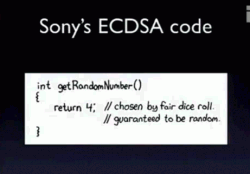Weekly News Roundup (28 October 2012)
So Windows 8 has been released. Having used the OS for a whole of zero minutes, I can offer my expert opinion that it is indeed a new version of Windows that offers some differences to the previous version, but also that some things remains the same. There are apparently quite a few good things in it, as well as some bad, and that if you really want it, you can get it by paying money for it. So that’s my 15 second review, hope it was very helpful!
If that wasn’t so helpful, then perhaps I can be a little bit more helpful with what you’re actually here for – the weekly news review. Let’s get started.

The Finnish arm of Netflix managed to get itself into a little bit of a copyright trouble this week as subscribers found that the subtitles used for one particular TV series came from a fan-subtitle site. Netflix might have used pirated subtitles for the sci-fi TV series, Andromeda.
Nobody knows how Netflix, who pays a lot of money to license official subtitles, ended up using subtitles created by DivX Finland (and you knew it was their sub because the subtitles displayed their website’s URL as part of the credits). Netflix have promised to launch an official investigation, and have temporarily removed the entire series from their system, but the folks at DivX Finland (probably no stranger to copyright issues) found the situation extremely ironic no doubt.
Copyright law I believe treats translations (and transcriptions) as derivative work, and that would still require the owner’s permission for distribution. The translation itself, as it does involve creativity, is also protected by copyright, copyright that Netflix infringed when it used DivX Finland’s subs without permission.
I have an extra interest in subtitle and subtitle download sites because I believe that my website was one of the first, if not *the* first website to host the download of DivX subtitles files (this would be June 2000, when DivX Digest was launched and user submitted/ripped subtitles were made available for download for a few dozen different TV shows and movies). The section only lasted about 3 month and at its peak, it contained about 500 different subtitle files – I discontinued the service due to potential copyright issues, and as I was doing all the updates manually at that time, it was also becoming too much work. Better organized websites had started to appear at that time as well, so I let them do their thing.

By the quirks of the copyright law, jailbreaking an iPhone is okay, but jailbreaking a tablet is a no no
Some might argue that fan made subtitles should be considered fair use, especially if it’s the kind of thing that improve accessibility. It’s a shame nobody put the case forward to the US Copyright Office for their once-every-3-years copyright review, but given the results of the latest review, it was unlikely they would have been accommodating. The latest review sees the jailbreaking of smartphones continue to be exempted from copyright laws, but the arbitrary nature of these exemptions meant that “tablets”, despite sharing the same operating system as smartphones in most cases, are not part of the exemption.
The reasoning the Library of Congress gives for this oversight is that they found the definition of “tablet” too broad, as it could encompass things like laptop computers (more of a problem now that Windows 8 is out) or even e-book readers. For e-books though, DRM ripping remains legal, and now even in the case where DRM-free versions of the same books are already available.
But movie lovers mostly miss out. While DVD (and Blu-ray) ripping received a few more exemptions in the cases of educational use, non commercial use, and criticism and analysis, ripping for “space-shifting” (for example, to convert a DVD to a format playable on an iPad) remains illegal. This is despite the fact that everyone does it with little or no harm to anyone concerned, a fact made clear by Public Knowledge, one of the consumer rights groups that argued for an exemption for ripping.
The EFF also petitioned for video game console hacking to be exempted, but their appeal also failed to convince the US Copyright Office. In another blow, unlocking of phones purchased after January 2013 will also no longer be exempted.
In my opinion, these complicated and often arbitrary exemptions can be made a lot simpler if one simply followed the rule that any act that has no serious commercial implications (eg. DVD ripping for home use) should be considered fair use, as is everything in which the social benefits outweigh any commercial concerns. And all fair use should be legal, with specific exemptions being made for really popular acts in order not to criminalize a huge percentage of the population. How hard is that?

With Mozilla all but signalling defeat in the battle to keep H.264 out of the HTML 5 specs back in March, the inevitable is happening as Mozilla announced that the desktop version of Firefox will be getting OS-level native H.264 support soon. The mobile version of Firefox has already made this move, but with Flash still being a viable option on desktops, there was less urgency in adding in “native” H.264 support.
Mozilla’s beef with H.264 is that it doesn’t fit in with the open-source, royalty free nature of Firefox. But H.264 has become an industry standard as you’ll be hard pressed to find a modern device that doesn’t support H.264 these days (just as you would be hard pressed to find one that supports Mozilla’s favoured alternative, WebM).
Having OS based native support ultimately means that Flash won’t be needed. So in the end, it was really the choice between two evils. Flash and H.264, with H.264 winning in the end – not the worst result, if you ask me.
And I suppose I should talk about the iPad mini, at least from the point of view of HD video. There’s no doubt that 7-8″ tablets are the perfect consumption platform for video, which is why Amazon has the Kindle Fire, and why Google has the Nexus 7. I keep on getting the feeling that Apple will soon drop a bombshell that will completely shakes up the digital video rental and subscription streaming markets.
![]()
Ubisoft has been making a concerted effort to distance the company from their past anti-piracy controversies, at least that’s what they said a couple of weeks ago. So you would expect the company to be extra careful to avoid any more anti-piracy related mishaps, at least for a short while. Well, the calm lasted about 6 weeks, as this week, Ubisoft enraged paying customers yet again by forgetting to include the CD key in retailed boxed PC versions of their new game, Rocksmith.
It took about a week for Ubisoft to respond, and even then, some customers were still left without a playable game for an extended period of time after going through the process. For those affected, they would need to provide proof of purchase to Ubisoft via their tech support website, which can be problematic for some if they’ve already discarded their receipt before realising Ubisoft’s mistake. Ubisoft has promised to compensate affected users with a free DLC (worth a whole $2.99), but it might very well be a case of too little too late for a company that couldn’t afford any more anti-piracy related scandals.

The “LV0” master keys leaked for the PS3 may prove the most costly to Sony yet, and make all future attempts to secure the console a very difficult proposition
Another gaming company that’s been trying to distance themselves from past issues is Sony, and their attempt to dig their way out from the various hacking scandals. But Sony does not appear to have any more luck than Ubisoft, with the news this week that a new set of master keys have been leaked for the PS3, keys that may make all future attempts to secure the console futile.
The new leaked keys, dubbed the “LV0” keys, could potentially prevent Sony from being able to secure the console again via a new firmware patch, which has been the go to solutions since the initial hack of the console, and when Sony managed to at least partially re-secure the console via the 3.56 firmware release.
While it’s disingenuous to blame these hacking attempts on Sony’s decision to pull support for Other OS, a popular PS3 feature (for the hacking community) that allowed Linux to run on the console – it’s very likely that the PS3 would still have been hacked due to the poor programming choices made by the security programmers – but it seems Sony’s decision to turn their backs on the hacking and modding community, having earlier promoted the console’s versatility and specifically the Other OS feature, does seem to have cost them. It certainly engergised the hacking community, and what we’re seeing now is the result.
Alrighty then, that’s it for the week. Back in seven with more news you can miss and it still won’t make a difference to anything in your life at all!

